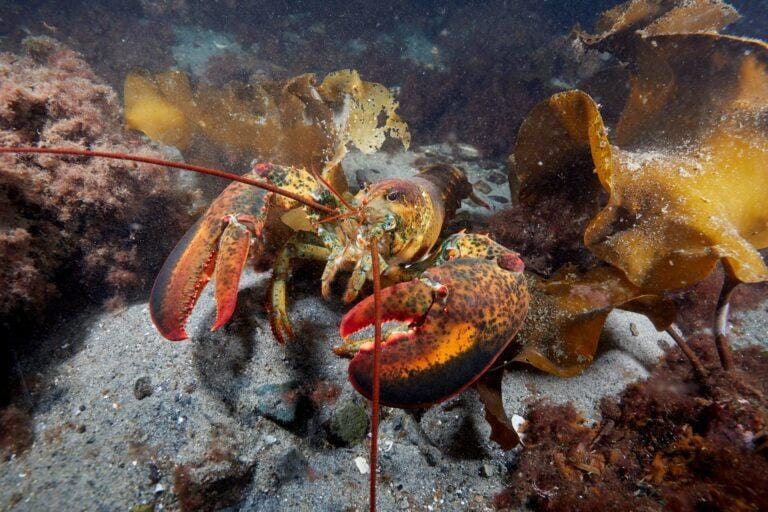- Peace and Environment News
- Posts
- Ontario's Opportunity to Lead Crustacean Welfare
Ontario's Opportunity to Lead Crustacean Welfare
A Global Awakening

Image Credit: Keith Ellenbogen
A silent story of sentience
Let’s take a walk in a busy restaurant kitchen. Amidst the clatter of the utensils, the hiss of steam, and a medley of salty, spicy, and sweet aromas, quietly tucked away in a corner is a water tank. A lobster, with its antennae gently probing through the water, hits the lobster next to it. It shares the tank with a dozen others, all sitting cramped in the tiny space.
The silent suffering of captivity triggers the memory of the vast and free ocean bed. The sound of claws knocking brings it back to the present, evoking feelings of distress.
This lobster isn't just a piece of seafood awaiting its fate. It's a sentient being, who, as science now overwhelmingly confirms, feels pain as acutely as our beloved pets.
Unfortunately, at present, for lobsters and other decapod crustaceans such as crabs and shrimps, the journey from the ocean bed to preparation is of suffering.
There are no, or unclear, regulatory guidelines over:
cooking practices—they are dismembered and boiled while still alive.
transport and storage—they are crowded in water tanks, kept on ice beds, etc.
Why do inhumane practices against decapod crustaceans exist?
Current animal welfare legislation in many countries, including Canada, does not recognize them as sentient beings. This is because it is only in the past few years that scientific studies have confirmed that they can feel pain and distress.
The science of sentience
An academic report published in 2021 by the London School of Economics, UK confirmed their sentience (1). Lab experiments have shown that they exhibit protective responses to injury, demonstrate learning ability, avoid unpleasant stimuli, and show long-term behavioral changes in response to stress (2,3). A crab has been shown tending to an injured claw (4,5) and a shrimp desperately trying to escape an electric shock (6).
Given this knowledge, it is our moral duty to amend our laws and establish humane ways to treat them. Many nations are recognizing this moral duty and turning the tide for, instead of against, decapod crustaceans.
A global awakening
Norway (7), Austria (8) and the UK (9) have recognized crustaceans as sentient beings in their animal welfare laws, requiring their humane treatment. In New Zealand (10) and Switzerland (11), regulations require that they must be stunned before cooking.
These countries have chosen to align policy with scientific understanding, demonstrating that protecting crustaceans isn't only a compassionate choice, but a logical step in the evolution of animal welfare.
Ontario as a leader in animal welfare
Now is Ontario’s opportunity to demonstrate compassionate and ethical leadership by including them in the Provincial Animal Welfare Services (PAWS) Act. Doing so would:
Establish humane ways of treating them—for example, rendering them unconscious before slaughter to minimize suffering.
Deepen public trust in compassionate governance
Address the gap between animal science and policy
Our leadership in animal welfare
We are GentleWays for OurPlanet, a local environmental non-profit organization dedicated to weaving compassion and science into policy. We are leading a petition to get decapod crustaceans included in Ontario’s PAWS Act.
Your leadership
You can help strengthen the wave of compassion for these animals. Here are two ways:
Sign our petition ‘Humane Ways for Lobsters’ [link]
Tell a friend
Malvika Chandnani is the Environmental Sustainability Coordinator for GentleWays for OurPlanet.

References:
Birch, J., Burn, C., Schnell, A., Browning, H., and Crump, A. (2021). Review of the Evidence of Sentience in Cephalopod Molluscs and Decapod Crustaceans. The London School of Economics and Political Science.
Magee, B., and Elwood, R. W. (2013). Shock avoidance by discrimination learning in the shore crab (Carcinus maenas) is consistent with a key criterion for pain. Journal of Experimental Biology, 216 (3), 353-358.
Magee, B., and Elwood, R. (2016b). No discrimination shock avoidance with sequential presentation of stimuli but shore crabs still reduce shock exposure. 5, 883-888, doi:10.1242/bio.019216.
Elwood, R. W., Barr, S., and Patterson, L. (2009). Pain and stress in crustaceans? Applied animal behaviour science, 118 (3), 128-136.
Dyuizen, I.V., Kotsyuba, E.P., and Lamash, N. E. (2012). Changes in the nitric oxide system in the shore crab Hemigrapsus sanguineus (Crustacea, decapoda) CNS induced by a nociceptive stimulus. Journal of Experimental Biology, 215 (15), 2668-2676.
Maldonado, H., and Miralto, A. (1982). Effect of morphine and naloxone on a defensive response of the mantis shrimp (Squilla mantis). Journal of comparative physiology, 147 (4), 455-459.
Government of Norway: Animal Welfare Act, 2009
Austria: Federal Act on the Protection of Animals (Animal Protection Act – TSchG)
Government of UK website: Lobsters, octopus and crabs recognised as sentient beings
Government of New Zealand: Animal Welfare (Care and Procedures) Regulations 2018 Legislation
The Swiss Federal Council: Animal Welfare Ordinance Act 2008
Reply